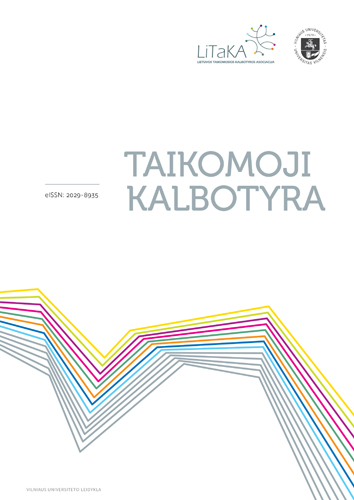Tarmės socialinė vertė: Lietuvos miestų jaunimo kalbinės nuostatos
The social value of a dialect: linguistic attitudes of young people in Lithuanian cities
Author(s): Meilutė RamonienėSubject(s): Sociolinguistics
Published by: Vilniaus Universiteto Leidykla
Keywords: language attitudes; standard language; sociolinguistics; social value;
Summary/Abstract: Language standardization ideology prevailing in most European countries sustains a lower social value of dialects in comparison to the standard language. The linguistic variety of social elite, media, public administration, and public use – the standard language – is often rated as ideal or at least more adequate for most domains of language use than local dialects. This paper investigates the situation in Lithuania, analyzes linguistic attitudes towards dialects of upper-secondary school students in Lithuanian cities. The data gathered in the context of the project “Lithuanian language: ideals, ideologies and identity shifts, 2010-2013” group discussions organized in schools of nine Lithuanian cities (Alytus, Kaunas, Klaipėda, Marijampolė, Panevėžys, Šiauliai, Telšiai, Utena and Vilnius) as well as the experimental data, is analyzed for the social value of Lithuanian dialects. The research revealed both overt and covert prestige of dialects. The overtly declared prestige of a dialect is weak and the social value is lower when comparing to the standard language. Moreover, the usage of a dialect is fairly strictly limited and involving only a private sphere, non-official communication. On the other hand, an indirect evaluation when describing stereotypical characteristics of a dialect speaker has shown a rather positive covert prestige of the dialects. Even though dialect speakers are not distinguished by a superior status or social power and are most often seen as coming from a rural environment, which is not modern and associated with old traditions, social attractiveness of a dialect speaker is specifically emphasised, also the dimension of social solidarity and resistance to standardization associated with a dialect is highlighted. The results of the research point out some tendencies of the (not yet extinguished) vitality of dialects.
Journal: Taikomoji kalbotyra
- Issue Year: 2013
- Issue No: 2
- Page Range: 1-18
- Page Count: 18
- Language: Lithuanian

